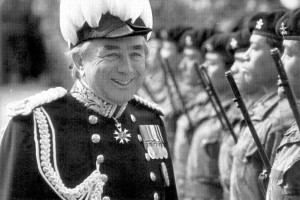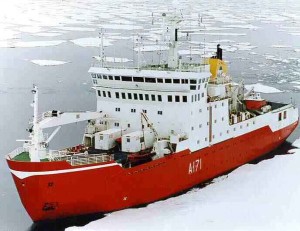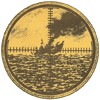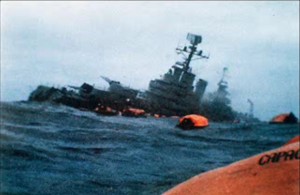Did the Argentine government intend the Falklands invasion? Argentine’s Foreign Minister Costa Mendez always argued that, had his government wanted to invade the Falklands, then it would have waited a year or so – or even, until the end of 1982 (Gavshon & Rice, p.30): after all, the British navy was facing massive cuts and was about to sell off its big aircraft carrier – the cost of keeping Trident was hitting the Navy in a big way. And, Argentina was just acquiring dozens of Exocet missiles from France, and a lot of Super-Etendard airplanes by the end of 1982. It would have made no sense for the Argentine government to intend to initiate war at that moment. The argument works better the other way round, that May 1982 was the last moment in which the British Navy could have mounted such an attack, and hoped to win. Thus there might be something to Tam Dalyell’s argument, that the Argentines were ‘lured on to the punch.‘
What did Argentina want? It wanted the negotiations which it had been pursuing with Britain over the Falklands to move constructively towards implementing UN Resolution 2065, from 1965. Britain had been stalling over these, and Argentina intended to ‘alert the United Nations of British intransigence and haphazard negotiating postures:’
Between March 1 and March 9, 1982, the Argentinians analysed further actions that might be taken regarding the situation with the United kingdom. The January objectives had not been fulfilled in the New York meetings, and London was not reacting favourably. The recommended actions indicated that Argentina would wait until March 30 for a British answer to the January 27 proposal. If no answer arrived, a formal diplomatic protest would be made in the international arena. Votes would be lobbied for a future meeting of the General assembly of the United Nations (because Great Britain held veto power in the security Council.) Virginia Gamba, The Falkands/Malvinas War, 1987, p.117.
There had been a January deadline by which the bilateral sovreignty negotiations had been supposed to get somewhere (which we needn’t go into). Britain knew it could not keep stalling much longer, so what could it do instead?
Genesis of the Falklands War
Constantino Davidoff was a scrap-metal merchant. He gained a contract with the European transport company Christian Salvesen based in Scotland, to dismantle an old whaling station at Leith harbor on the island of South Georgia. It took him a while to find a ship that would transport his group of forty or so workers over from the mainland – he earlier asked the captain of HMS Endurance the British icebreaker, who declined. Finally, he gained permission and notified the British embassy of his visit, and on 19th March 1982 he and his workers landed, and the escort ship Bahia Buen departed on the 20th.
The Governor of the Falkland Islands Rex Hunt had an animus against Davidoff, believing he should have stopped off at Port Stanley to request permission. But, as Virgina Gamba explains, Davidoff had obtained bilateral permission, from the UK and Argentine embassies, and was not obliged to obtain trilateral permission by also consulting the Falklands governor, indeed that could have upset the delicate balance of ongoing negotiations over sovereignty had he done so. But Hunt knew perfectly well of this visit and its (civilian) purpose.
On 20th March the Argentine Foreign Affairs minister Costa Mendez received a phone call about an alleged war-provocation – the British ambassador wanted an explanation! On 23rd The Times ran an article ‘Argentines hoist a flad on Fallands’ averring that the landing was ‘illegal.’ British sovereign territory had been invaded, by ‘troops and suspicious civilians’ – had they maybe shot some deer as later alleged, or raised an Argentine flag?
RexHunt
 These ‘news reports’ originated in Port Stanley. Governor Rex Hunt and the captain of HMS Endurance had cabled a report, averring that ‘Argentine military personell’ had landed, and there had been ‘shooting incidents.’ This report was the cause of the newspaper headlines.
These ‘news reports’ originated in Port Stanley. Governor Rex Hunt and the captain of HMS Endurance had cabled a report, averring that ‘Argentine military personell’ had landed, and there had been ‘shooting incidents.’ This report was the cause of the newspaper headlines.
Really, it was the cause of the war. (You might want to re-read Evelyn Waugh’s novel ‘Scoop’ where a journalist writes about a war that is not actually happening; soon, his accounts are enough to get it started! )
On March 20th the icebreaker HMS Endurance set sail from Port Stanley, towards South Georgia, supposedly to stop whatever ‘invasion’ was taking place. But, it had been floating off South Georgia for the previous two weeks, so could have easily stopped anything it had then wanted to: instead, on the 19th it set sail for Port Stanley, took on some troops, and then turned round to return: a very media-visible act, surely (or so Virginia Gamba has argued) designed to block its scheduled withdrawal from the area in mid-April.
troops, and then turned round to return: a very media-visible act, surely (or so Virginia Gamba has argued) designed to block its scheduled withdrawal from the area in mid-April.
‘On Sunday, March 21, London was swarming with news of an “Argentine invasion.’ The magnification of the incident in the press was so overwhelming that the House of Commons anounced its intention to debate the issue on Tuesday, March 23′ – Virginia Gamba, op. cit. At that Commons debate, the South Georgia non-incident was declared to be a reason for needing a major garrison around the Falkland Islands. And, the HMS Endurance would ‘evict’ the scrap-metal workers. If a flag had been planted for a ‘short period’ it had now been removed, the Foreign Office minister explained.
On the 23rd, the Foreign Secretary Costa Mendez warned the British Ambassador that an ‘immoderate response’ would cause him to ‘lose control of events.’ That soon happened, as the military junta responded to the tough talk in london: on the 24th, the Bahai Paradiso unloaded some Argentine military personell onto South Georgia, to protect the scrap-metal workers.
Reporting this statement by costa Mendez, the British Ambassador warned the Foreign and Commonwealth Office that, seen from Buenos Aires, ‘the British Government’s reaction to Sr. Davidoff’s “trivial and low-level misbehaviour” could do lasting damage to the whole structure of bilateral relations.’ (Gamba, The Falklands/Malvinas War’ p119) It started the war!
On the morning of 28th, newspapers announced the sending of a British nuclear-powered submarine to the Falklands, HMS ‘Superb.’ That was by any standards a highly provocative act. Possibly it was a violation of the nuclear-free status of South America (Treaty of Tlatalolco). It was all the Argentine junta needed, to begin their military invasion. Likewise, as Tam Dalyell reported, on 28th of March, ‘the crew of RFA Fort Austen were told by the barmaids of Gibralter that they were not going home to Britain after five and a half months in the sweltering Gulf but to the South Atlantic’ (TT 32).
This news, together with the UK’s House of Commons debate, was enough to trigger the Argentine invasion, which sailed on the 28th. This brought the matter to the front page of The Times, ‘Falklands Tension Grows,’ reiterating the incorrect claim that ‘Argentines have illegally landed.’
On April 1st Argentina put its case before the UN Security Council. Its claim that a British task force had set sail on 25th March was not there disputed.
………………………………………………………………………………………………….
The above is summarised from Virginia Gamba’s book ‘The Falklands/Malvinas war’ (1987), plus The Times newspaper; it is of interest to compare this with a talk she gave in a 1996 documentary, shown here. ‘CAUSAS DE LA GUERRA DE MALVINAS’ i.e., causes of the Falklands war. (www.imdb.com/title/tt0107167/maindetails) . An English transcript has been kindly provided by Jose Sonny (falklandstruth.blogspot.com ) on the war-outbreak. Ms Gamba has held prestigious positions including being a professor at King’s College War Studies Department.
Transcript
Mr. Davidoff and his group of workers in the Georgias were not part of an Argentine strategy to generate an excuse to start a War – as the main British hypothesis states – which is even spread in Argentina. The reality is that Davidoff officially informed the British Embassy in Buenos Aires that he is carrying out his third journey. He gives a list of the workers who will be on board, the groups of navy transport that will drive them to Georgia along with the dates of departure and arrival.
At that moment, three very important persons were gathered in the Falklands/Malvinas: Captain Barker of HMS Endurance, Rex Hunt, governor of the islands and the British Lord “Bagstone” who greatly admired the living standard of the Islands. He was someone with great access to the communication companies in Britain because of his position in the communication systems in London, plus he was a member of the Falkland Islands Lobby that was represented in the House of Commons.
These three persons gathered and issued a report — at almost the exact same time the Argentine workers landed in the South Georgias – which stated that it was all part of an Argentine plan operation intended to organize a further invasion of the Falklands. In this report, the real activities of the workers were clearly exaggerated: it indicated that they carried weapons, that there had been shootings, that they wore uniforms and that it was all therefore an obvious military invasion in the South Georgias!
In response to this, Britain starts to gather information from other sources, not from Stanley, but from people of the ‘British Atlantic Group’ – this group told them that the report issued from Stanley was clearly exaggerating the real facts. We must thus suppose that the outcoming information from Port Stanley was not only deliberately exaggerated but that it was also intended for another concrete purpose.
London promised the Argentine business men that it will start to discredit all the report’s information about the so-called Argentine invasion of Georgia, while excusing themselves for protesting so little about the matter – indicating that the most important thing at that moment was the search of a honourable outcome for both sides.
Curiously ,the following day, various newspapers in London published articles which considered a possible Argentine Invasion of the Falklands. The most popular newspapers in that time repeated that information and accused the government of Mrs. Thatcher of ignoring the defense of Britain. At this point, a very important element emerges: The deployment of a British ship, in this case the HMS Endurance with 20 Royal Marines to the Georgias whose mission was the expulsion of the Argentinian workers from that territory.
The Argentine Navy considered this to be completely inadmissible and in consequence it deployed a ship to prevent the HMS Endurance from accomplishing its mission. In Bahía Paraiso, the orders were completely clear: It had to reach Georgia earlier than the Endurance for it would have to land argentine marines to protect the Argentine workers and prevent them from being taken prisoners by British forces and start a diplomatic mission afterwards. In case it did not reach Georgias on time, it would not have any type of possibility to interfere with the plans of the Endurance.
Now, if we are given to understand that Argentina was in fact seeking for an excuse to invade the Falklands: wouldn’t it have been better for them to let the Endurance take the argentine workers prisoners and later attack the Endurance in that basis? Or, going even further, wouldn’t it have been better to even let the Endurance drive them to the Falklands and later attack the islands under the excuse of resucuing them?
On the 23 of March there was a wide debate [House of Commons, NK] in which people called for the return of the Old British Imperial values. There were calls for the Prime Minister to resign, as there had also been strong attacks against her Defense Policy arguing that the Endurance must be sent disregarding what the Argentinians had done in there or not. They also argued that the events occurring in Georgia clearly demonstrated the devious intentions of Argentina over the Falklands’ issue and that all sovereignty negotiations ought to be therefore completely cancelled and that a permanent defense structure must be built in the Falklands.
The following day, the newspapers published information about two nuclear submarines being deployed/dispatched to the Falklands. In Spain, British ships operating for NATO around Gibraltar were noticed as they were moving to the South Atlantic. Other sources of information state that there’s a significant increase of British soldiers in the Falklands. From Belize in the Caribbean – which is also a British Colony – a British destroyer that was taking part in military exercises in conjunction with the United States was reportedly noticed as it was sailing South.
As a result of all this information, the Argentinians had a terrible dilemma in mind for they knew that if they didn’t react, not only the Georgias would be lost. Georgia was no longer a problem, or only till the 25th of that month.
But, bearing in mind the huge incoming force in addition to the political declarations in the House of Commons, it all suggested that Britain has completely changed its goal: to re-enforce the Military Defense of the Falklands and thus avoid and refuse any type of sovereignty negotiation in the future. As a response to this, Argentina also changed its goal.
…………………………………………
Before Ms Gamba started to speak, a few words were spoken by Constantino Davidoff, also kindly translated by J.S:
Narrator: Hired for its scrapping, the Argentine enterpreunor, sends a small group of workers who
raised an Argentine flag after they landed. The information sent to the British intelligence
from Stanley describes this event as a military occupation.
Reporter: r. Davidoff, what is your company doing in those islands?
Davidoff: We’re carrying out of a contract for scrapping a whaling station.
Reporter: Is this a task delegated by a foreign company?
Davidoff: Our company is an Argentine. We were hired by a foreign company, a British company
and we’re carrying out a scrapping contract.
Reporter: How many workers do you have in your staff?
Davidoff: 39
* Another man appears, I still don’t know who he is… and the reporter asks him: Do they carry weapons? Man: I can strongly assure you and confirm that they do not carry any weapons at all.


The timeline given here is ludicrous. How on earth can you weite a history of “How It Began” that fails to acknowledge that Argentina had been planning an invasion for some time before the scrap merchants arrived on South Georgia?
By the admission of junta members planning for invasion of the Falklands had already begun on the 9th of December 1981 after a meeting between General Galtieri and Admiral Anaya. On the 15th of December, 1981 Admiral anaya met with Vice-Admiral Juan Lombardo and ordered him to prepare a plan for the invasion of the islands. According to Lombardo, his orders were to prepare a plan to “take them but not necessarily to keep them”. Lombardo shortly afterwards flew to Buenos Aires to clarify these orders. In his words –
“I went back to Buenos Aires to insist that, if the operation was to be joint, co-operation with the other services would be essential. Anaya agreed that General Garcia of the Army was in mind but had not yet been informed. He repeated that it was a Navy task to take over the Malvinas; what followed was for the junta to decide. They did not think there would be any military reaction from the British.”
Here is the basic reason for the entire war: The Argentines thought they could take the islands without any “military reaction from the British”. This is the reason why they invaded, and why they were so unprepared for a counter-attack.
Remember, this was all before the Argentine diplomatic offensive in January 1982 – Costa Mendez did not even know that the invasion was being planned, though Galtieri was of course aware as he had ordered it to be prepared. Galtieri allowed Mendez to go ahead with his diplomatic overtures in the knowledge that Argentina would soon launch an unprovoked attack on the Falkland Islands.
You attempt to imply that the war was provoked by reports (true reports, according to all involved) on the activities of scrap-merchants in South Georgia shooting deer, raising the Argentine flag and so-forth, but the basic fact is that the Argentine invasion plans were well advanced by then, and at most the incident on South Georgia prompted the Argentines to bring their plans forward out of fear that Britain would reinforce its defences on the islands.
I have been investigating for the Helicopter Museum in Weston super Mare the story of Wessex Mk 5 helicopter XS486 which was involved in the last episode of the Falklands conflict, the removal of Argentinians from the island of South Thule, the most remote part of the (then) Falklands Islands Dependencies, after the conclusion of hostilities on East and West Falkland on 14th June 1982. There had been an Argentinian camp on South Thule since 1976, and although the British Government sent a note of protest, it was content for the matter to be part of negotiations for the next six years.
After the removal of the Argentinians (whose status – whether military of civilian – seems to be in dispute) the camp on South Thule was dismantled, though more recent photos show a good deal of scrap metal wreckage still lying about..
The fact of this earlier aspect of the dispute seems to be missing from the copious historical material above.